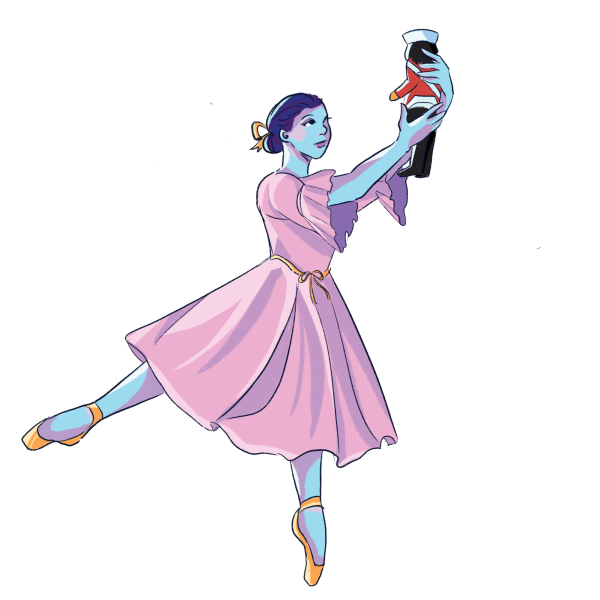A Beautiful Tale of Two Beautiful Neighborhoods
January 15, 2020
“You were a child once, too.” The late Fred Rogers said this decades ago, but it still remains in the hearts of many people to this day. Rogers will continue to influence generations with his television show “Mister Rogers’ Neighborhood”, which first aired in 1968. When the movie “A Beautiful Day in the Neighborhood” starring Tom Hanks and Mathew Rhys was announced, many of the same people who enjoyed the original show were delighted to see the story of Mr. Rogers transposed to the big screen.
“Mister Rogers’ Neighborhood” was an influential television show on PBS, airing for over 30 years until 2001. The program was meant to teach children about their feelings, difficult topics like divorce and war and other important concepts, such as equality and diversity. Rogers’ goal was to teach kids lessons he wished he had learned as a child. The show dominated the television industry for years and was loved by thousands of people for the heartfelt and wholesome messages spread to children and families across the nation. Fred Rogers became a household name, and many people grew to appreciate him and his ability to inspire and teach children.
Though I had never actually seen the show when it originally aired, I was still subject to its effect on the people around me when I was a child. My parents and grandparents have talked fondly of Rogers, and I watched the show “Daniel Tiger’s Neighborhood”, a spinoff made later that echoes similar sentiments.
Due to this early exposure, the hype surrounding Rogers and the influence he had on others that I knew, I grew to admire him without even having seen his show. This experience is shared by many of my peers, too. The nostalgia that surrounds Rogers has created a wonderful legacy to be left behind. He affected a large number of people, introducing them to important messages. Although his show has been off the air for almost 20 years, and Rogers has since passed, kids are still learning the same lessons he taught their parents.
The biographical movie, or biopic, “A Beautiful Day in the Neighborhood” was in the making for a few years before it was finally released on Nov. 22, 2019. The movie doesn’t focus on Rogers himself as much as I expected, though. The film tells the story of Tom Junod, a real journalist who wrote an article on Mr. Rogers and his show for Esquire Magazine back in 1998. Junod, the main character of the biopic, is portrayed as the fictional Lloyd Vogel, a very dejected journalist.
When Vogel first begins to work with Rogers, he is unimpressed and isn’t able to relate to Rogers’ friendly, upbeat, and affectionate personality. Vogel sees Rogers as silly and naive and doesn’t understand where his energy comes from. Throughout the movie, Vogel and Rogers become closer, bonding throughout the multiple interviews they arrange. Through Rogers’ mentoring, Vogel develops a better relationship with his wife, gets to know his estranged father better, and realizes the kind of person he wants to be for his own son. In the end, Vogel winds up with a different outlook on life and a better understanding of himself. Vogel also becomes very good friends with Rogers and winds up writing a long and deeply moving article about Rogers and the effect Rogers had on his life.
I think this movie intimately displays the effect that Rogers had on so many individuals. His values and ideas were important to a great number of people and Lloyd Vogel, or Tom Junod, is just one of thousands, if not millions of people deeply influenced by Fred Rogers. The movie also takes time to show a bit of Rogers on a deeper level, revealing more about his faith and relationship with God– a side of him that wasn’t very publicly known.
“A Beautiful Day in the Neighborhood” is not the only film about Rogers. Last summer the award-winning documentary “Won’t You Be My Neighbor?” was released. The box office hit is a piece that focuses more on the actual show “Mister Rogers’ Neighborhood”. It addresses Fred Rogers’ life, how he became Mister Rogers, the show’s production, the actors involved, and most importantly, the program’s goal. The show’s aim was to “help children through some of the difficult modulations of life,” as Rogers said.
The documentary goes into great detail on Rogers’ life explaining his early childhood and his decision to leave seminary school to pursue a career in the entertainment industry. When Rogers discovered TV, he thought that there should be a program to teach children rather than the seemingly pointless and violent ones that were on at the time.
Rogers believed that television was a tool that could be used to teach children about themselves and their feelings. He used his own ‘inner child’ to talk to children and relate with them on a more personal level. Rogers believed that he could create a national community through concepts such as conflict management and love.
This documentary also highlights the many people who knew and were close to Rogers. The film showed the role he played in his loved ones’ lives and how much he meant to them. He was very much his TV persona in real life and was just as kind and benevolent.
I don’t think that one film was better than the other, because they were actually quite different and good in their own ways. I do think that the documentary is very lighthearted, whereas the biopic is more serious. The biopic hones in on the feelings and emotions that Rogers targeted in his show, showing how Rogers wanted to help children deal with those same feelings that Vogel felt. The documentary demonstrates why Rogers was so intent on helping children, and how he was able to get his message across through the help of television. The documentary went more in-depth about the show’s production. Both movies were very good at portraying Rogers’ wholesome personality and his ability to connect with people, and each shows the amazing and lasting effect Rogers had on his audience through the T.V, in a unique, satisfying way.
I think that “A Beautiful Day in the Neighborhood” and “Won’t You Be My Neighbor?” were two very good movies that portrayed the same topic in a different light. They both treated Fred Rogers’ purpose and goals with respect and showed the importance that he and his show had. The movies also allowed Rogers’ legacy to continue inspiring many people as it once did many years ago. I believe that Mister Rogers created a very large and supportive community and that his influence is far from over yet.








